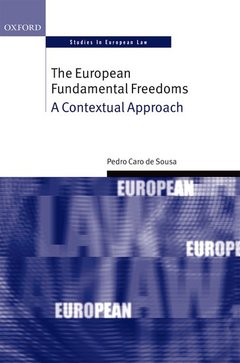The European Fundamental Freedoms A Contextual Approach Oxford Studies in European Law Series
Langue : Anglais
Auteur : Caro de Sousa Pedro

Law can be looked at from both an internal legal perspective - reflected in the official discourse supporting legal decisions - and an external perspective - which is pursued by studies that look at the law from the outside as the subject of sociological, economic, or philosophical analysis. This external dimension - related to extra-legal factors that impact the law, such as the institutional environment in which the law is applied - is usually ignored, or not addressed systematically by studies that focus on the internal perspective. By systematically internalizing these 'external' elements into legal theory and practice, contextual approaches lead to the development of better descriptive theories and more attractive normative models of the law, and specifically EU law, than de-contextualized approaches allow for. Additionally, contextual approaches are more self-aware than de-contextualized approaches, since they are able to make sense of the role that legal practice (by judges, legal practitioners, and academics) plays in the development of the law. It is through a contextual approach that Pedro Caro de Sousa develops a general theory of European constitutional law, in particular free movement law and the EU fundamental freedoms. As a contribution to the development of EU constitutionalism, this monograph focuses on the interplay between the different normative concerns behind the EU's market freedoms identified in traditional legal discourse and the various extra-legal and institutional factors that affect how that law is applied and develops in practice. Moving away from traditional studies of free movement law, Caro de Sousa's book offers a fresh approach to free movement law. Rather than proposing normative approaches, he uses this approach to construct a broader thesis: that the EU law of free movement can best be understood as interplay of traditional legal doctrines and practices and the specific institutional environment where this law is applied and developed.
Pedro Caro de Sousa specializes in EU Law, International Economic Law, and Competition Law. He has also researched on Legal Theory and Public Law, particularly on Constitutional Law and Theory. He has published numerous articles in peer-reviewed journals, including the European Law Review, the European Law Journal, the German Law Journal, the Cambridge Journal of International and Comparative Law, and the European Journal of Legal Studies. Pedro is currently a Lecturer in Law at the University of Reading, and a Visiting Tutor in EU Law and Competition Law at the University of Oxford. In the past he has also taught at King's College, London, at Universidade Catolica de Lisboa, and been a Graduate Teaching Assistant in Competition Law at the University of Oxford. He is a dual-qualified lawyer (in Portugal and England and Wales), having worked for many years at Linklaters LLP in both Lisbon and London.
Date de parution : 04-2015
Ouvrage de 300 p.
15.7x23.9 cm
Thèmes de The European Fundamental Freedoms :
© 2024 LAVOISIER S.A.S.



